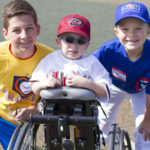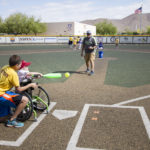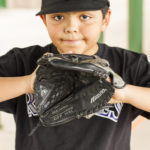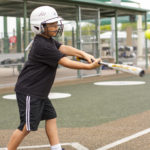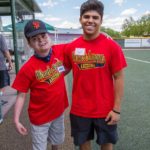Field of Big Dreams: Miracle League of Arizona
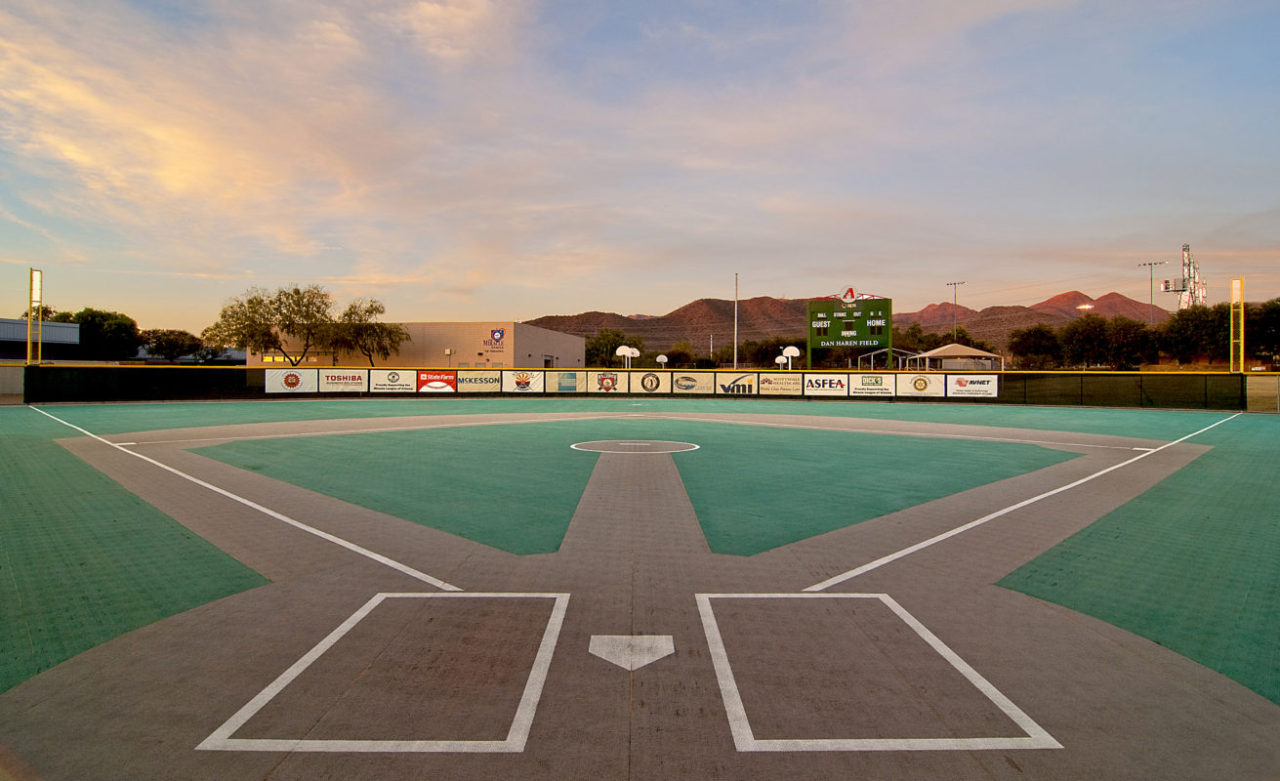
Writer Shannon Severson
Photographer Lacy Kruger
[dropcap]B[/dropcap]aseball is the ultimate American game. The national pastime, mom and apple pie all rolled into one glorious notion that blends the seemingly incongruous images of perfectly manicured fields and empty dirt lots, and calls to mind the skilled, sinewy power hitters wielding Louisville Sluggers in palatial stadiums in almost equal measure to dusty little kids swinging sticks on neighborhood streets. In essence, it’s a game that can be enjoyed and played by just about anyone.
But for children with disabilities, there are barriers in the traditional version of baseball that prevent them from playing and enjoying the Grand Old Game with their typical peers. Enter the Miracle League of Arizona (MLAZ) in North Scottsdale and their motto: “Every child deserves the chance to play baseball.”
MLAZ offers children, teens and adults with disabilities or special needs the opportunity to experience the joy of playing baseball in either a non-competitive or competitive format, removing barriers and providing one-on-one assistance, often hands-on, by a crew of community ambassador buddies. The turf is rubberized and the bases are flat for easy maneuverability by those who use wheelchairs or other devices to get around, or struggle with an uneven gait.
“The Miracle League stadium is the only stadium in the world that is totally accessible to athletes with disabilities,” says MLAZ board president Al Maag. “Our new field and seating, restrooms and playground — everything has been thoughtfully planned out to accommodate our athletes and families.”
The brainchild of Dan Haren Sr. whose son, Danny Haren, played for the Arizona Diamondbacks; baseball legend Harmon Killebrew; Lee Klein; then-board president Frank Udvare and his brother, Gene, the organization received an initial grant of $380,000 from the team in 2008 and secured land via a donated lease from the Scottsdale Unified School District. An initial major capital campaign raised $1.83 million for the construction of the state-of-the art facility, which also boasts flat dugout areas, a scoreboard and sound system.
Continued grants from the Arizona Sports and Tourism Authority and Thunderbirds Charities followed in 2013, allowing the addition of picnic areas, an adaptive playground, barbecues and the first and only Miracle League batting cage facility in the country for athletes to hone their skills before games. Families are never charged a fee to play; support comes from community fundraisers to help cover the annual operating costs, and the board is always looking to expand.
“We want to make the Miracle League in Scottsdale the best experience for special needs families,” says Maag. “We want more athletes, more volunteers and always more donors and corporations who want to associate their brand with our significant and vital activities for special needs kids. Many want to help because they have an affected family member or good friend, or they wish that a loved one could have played ball in the past, so they get involved now to help this next generation be able to play. We hope for more Miracle Leagues to pop up across Phoenix and would like to help mentor, advise and be a model for other fields throughout the United States.”
Executive Director Cassandra Switalski oversees the program that has grown to nearly 200 athletes on 10 teams, ranging in ages from 4 to adult. There is a personal connection for Switalski, as her two brothers with special needs have been playing on the MLAZ field since day one.
“I played sports all through high school and college and my family was always there supporting me,” says Switalski. “Now, I get to turn the tables and support my brothers and their friends, cheering them on. That is what it’s all about.”
It’s that family support that brought Doña and Nick Engelmeier to MLAZ. Their 10-year-old son, Adrian, was diagnosed with autism at age 3, just a few years before his older brother, Danny, was diagnosed with, and eventually passed away from, acute lymphoblastic leukemia.
“I was completely blindsided by Adrian’s autism diagnosis,” says Doña. “He was non-verbal, had no emotional recognition and had so many needs, appointments and services. I had to learn to be his advocate, but I see that Adrian prepared me for his brother’s illness. My boys helped me learn how to take care of them.”
Years of early intervention therapies in their native Minnesota helped him make huge strides, and today he is a child who loves to chat everyone up and make jokes. When the family, who lives in Gilbert, heard about MLAZ from family friends who also had a son with autism, they decided that despite the distance and having no baseball experience, it was something Adrian should try. He took to it immediately and now his favorite position is catcher because, he says, “You don’t have to stand around the whole time.”
“Choosing Miracle League for baseball was a huge step,” says Engelmeier. “When he first transitioned to the competitive league, he was the smallest and youngest, but the older kids accepted him right away. It has made such a difference in his self-esteem. When your child has something he loves so much, you make the time and dedicate to it.”
And it’s not just Adrian on the field. His older sister, Domini, takes time out of her busy jiu-jitsu training schedule to be a buddy to Adrian and the kids on his team. The family makes the trek to Scottsdale an average of three times per week and feels fortunate to get to know the other MLAZ families.
“Adrian has a teammate who is partially blind, but bats it out of the park,” says Doña. “He has it figured out!”
Four-year-old Jackson Ensminger was born with myelomeningocele spina bifida, which affects the nervous system, bones, muscles and organs. He uses a wheelchair to get around, as he has no movement in his lower extremities. His parents, Amy and Ryan, first heard about MLAZ from their physical therapist.
“I was enthralled when I heard about it,” says Amy. “I was so impressed when we met Cassandra, the coaches and staff. They are so great with him. Jackson is outgoing and silly and can be shy about new things, but he has really opened up and progressed. He loves playing baseball.”
In fact, when Jackson first began, the loud crowd noises were distressing, so the game announcer would ask the crowd to cheer only by waving their hands, not clapping or yelling. After a few weeks, he became so comfortable that he now enjoys the cheers and clapping. Jackson opts to use a special standing wheelchair that allows him to be secured in a brace so he can be upright in the batter’s box. The smooth field surface allows him to freely hit, catch and throw the ball — which he says is his favorite part.
Since children with his condition can be prone to obesity, Jackson’s family is grateful for a physically active outlet, and overcoming the challenge of trying baseball has now prompted him to try equine therapy. Amy believes that taking a chance on baseball has opened up Jackson’s world to trying and doing more than he ever would have before. His world has expanded through the power of his adventurous spirit … and a little help from the game of baseball.
It’s stories like these that keep Maag coming back to the stadium week after week.
“Prior to Miracle League, I had no real experience with people who have special needs, and I’ve come to a whole different realization of the world,” says Maag. “I go to at least one game every Saturday and I always leave with a smile and a good feeling about life. If our kids can show that they can overcome obstacles, so can anyone.”


